14 November, 2018 | Awards, Resource and waste management
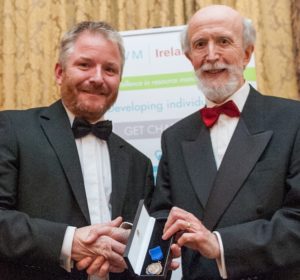
DCW hands over his CIWM Presidential Medal for 2018 to Mike Webster
https://www.babyscanclinic.com/blog/buy-cialis-tadalafil-online-20-mg/
At the CIWM Presidential Dinner at the Intercontinental Hotel in Dublin, after the inauguration of Enda Kiernan as the next President, DCW’s last act as the retiring President was to award his CIWM Presidential Medal for 2018. The recipient was Mike Webster, the founder and CEO of the new charity Wasteaid, which is working directly with local communities in some of the least developed countries to tackle the global waste crisis. The text of DCW’s speech is reproduced below.
‘Being able to award the President’s Medal is one of the perks of being President, and indeed the only thing that is expected of you after you hand over the chain…. The standard advice is to give it to someone who has particularly helped in my career or in my Presidential year.
I started out in 1974, so my early influencers are now either quite old or have already moved on to the great Circular Economy in the sky.
Looking back on my career, one of the aspects I take most pride in is the number of (then) young people whom I have either brought into the resource and waste sector, or to whose development I have made some contribution; and who I hope won’t be offended if I refer to them, tongue in cheek as, at least in part, my “protégées”.
I am also aware that, in the twilight of my own career, I am leaving behind much unfinished business. So, my thoughts here have gone to one of those protégées, whom I believe can take forward, and make a difference in, an area that is close to my heart. I devoted at least 20 years of my life to working with international organisations, national governments and large cities to develop integrated and sustainable waste management systems.
I have recently drawn attention to the global waste crisis, the more than 3 billion people worldwide who still lack access to basic solid waste management services, which reinforces the comparative failure of such top down approaches; yes, we have made some progress, but it is painfully slow, and corruption often impedes progress. So, I have come to the realisation that, in parallel, we also need to work from the bottom up.
This person is already making an impact, by opening-up opportunities for you and me, as individual resource and waste management professionals and as companies, to get involved and to make a real difference by helping local communities in some of the poorest countries to help themselves by making products to sell locally from the low value organics and plastics in the waste – thus helping to solve their local waste problems, keeping plastics out of the oceans AND giving themselves sustainable livelihoods to feed and educate their families.
This person has done this at considerable personal sacrifice, giving up a secure job to set up a new charity, initially drawing little or no salary while their children were still very young. The charity is now taking off, helped in part by the success of the CIWM-sponsored Toolkit; income has doubled this year, and looks set to triple that figure next year to more than a quarter of a million pounds.
The winner the 2018 CIWM President’s medal is Mike Webster, the Founder and CEO of our sector’s very own charity, Wasteaid.’
14 November, 2018 | Awards, Resource and waste management
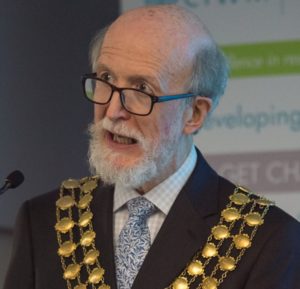
DCW gives his final speech as CIWM President
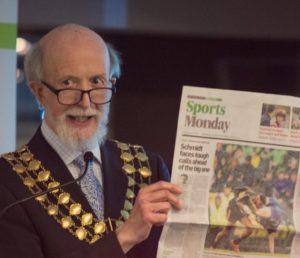
The Gaelic Football team which Enda Kiernan manages appeared in the lead photo story of the previous day’s Irish Times
Professor David C Wilson handed over the Presidency of CIWM, the UK and Irish professional body for resources and waste, to Enda Kiernan at the Aviva Stadium in Dublin on 13 November 2018. He highlighted plastics – both plastics entering the oceans and China’s ban on imports for recycling – as the dominant topic in his Presidential year. The public focus on marine plastics also helped dissemination of his Presidential report, the CIWM-Wasteaid Toolkit Making Waste Work; the website clocked 56,000 visits in its first year, with 7,000 downloads. DCW introduced his fellow Irishman, Enda Kiernan of Cork County Council as the next President. CIWM waited more than a century for its first Irish President; now we have had three in five years, and two in a row, although Enda is the first from the Republic of Ireland.
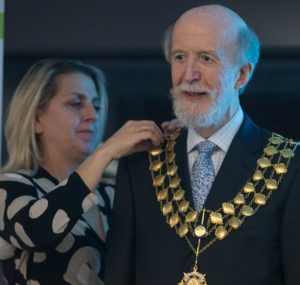
The chain of office is removed from DCW to pass over to Enda Kiernan
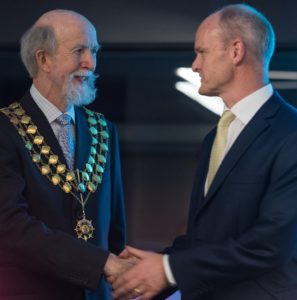
DCW congratulates Enda Kiernan on becoming the 103rd President of CIWM
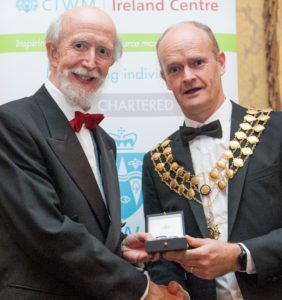
Enda Kiernan presents DCW with his Past President’s medal
14 October, 2018 | Publication, Resource and waste management
According to the UNEP and ISWA’s Global Waste Management Outlook (GWMO), three billion people lack access to basic solid waste management (SWM) services; addressing this global waste crisis would not only vastly improve their lives but also halve the weight of plastics entering the oceans. Professor David C Wilson and Mike Webster of Wasteaid made the case earlier this year, in an open access editorial in the ISWA journal Waste Management & Research, for community waste management as a ‘bottom up’ approach, to run in parallel to traditional ‘top-down’ approaches led by donors and governments.
Community waste management aims to help local communities in the poorest countries, where the local authority often has no funds to provide a SWM service, to tackle the problem themselves through the resource value in the wastes. If, for example, food wastes or low-value plastics are kept separate, they can be turned into new, useful products. With simple tools and the right knowledge, people can become self-employed recycling entrepreneurs, providing a very valuable service for the health and wellbeing of their community, and the whole planet – as well as reducing poverty and creating sustainable livelihoods.
One of the gaps identified by the GWMO was for practical guidance on such low-cost ‘waste to wealth’ technologies which involve minimal capital investment and make products to sell in a local market. DCW’s CIWM Presidential Report aimed to plug that gap: Wasteaid prepared a Toolkit, including a dozen How-to-do-it Guides for simple technologies using organics and low-value plastics.
While preparing the Toolkit, we identified a parallel requirement, for the scientific underpinning of some of the technologies. This month sees the publication of a paper on optimising the technology for producing plastic bonded sand blocks, for use e.g. as paving slabs, from the low value LDPE film plastic, which is a major problem even in the least-developed countries. Our team at Imperial College London was led by Professor Chris Cheeseman, with the laboratory research carried out by Alexander Kumi-Larbi Jnr and Danladi Yunana. The technology was developed by another co-authors, Pierre Kamsouloum, a self-taught entrepreneur from the Cameroun.





